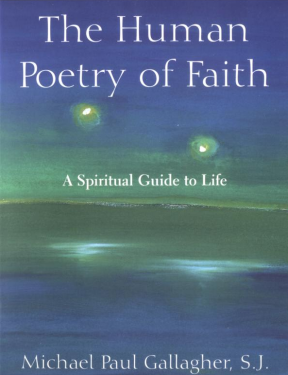 THROUGHOUT HIS BOOK, “The Human Poetry of Faith: A Spiritual Guide to Life (New York: Paulist Press, 2001, pp. 142, $12.95) Father Michael Paul Gallagher, S.J., has placed marvelous quotations from well-known authors.
THROUGHOUT HIS BOOK, “The Human Poetry of Faith: A Spiritual Guide to Life (New York: Paulist Press, 2001, pp. 142, $12.95) Father Michael Paul Gallagher, S.J., has placed marvelous quotations from well-known authors.
Re-reading Father Gallagher’s book, I find that almost all the quotations seem to have been written for me. Each speaks to me in a special way at this moment in my life. Each seems both insightful and provocative.
Two that I especially like are the following:
“Redemption is meaningless unless there is cause for it in the actual life we live, and for the last few centuries there has been operating in our culture the secular belief that there is no such cause” (Flannery O’Connor, p. 41).
“Human living as it is normally pursued is an escape from reality. The gospel message is a recall to reality, revealed as a mystery of forgiveness” (Sebastian Moore, from his book “God Is A New Language,” p. 41).
I love the idea that reality is ultimately a mystery of forgiveness. I imagine this is Pope Francis’ belief. This could be the reason that he has called for a Holy Year of Mercy. What a marvelous idea the Hoy Father has – a whole year devoted to experiencing, bestowing and celebrating mercy!
I have a friend who asks me what salvation means almost every time we meet. Somehow, I have to make salvation more real to him. I think Father Gallagher’s book is going to help me. It has helped me to see how wounded we are and how much we need the saving presence of Christ.
If we are not aware that there is something wrong with us, that we are far from perfect, that we are radically needy, or to put it simply, that we are sinners, then salvation may mean nothing to us. Unless we have some sense that we need to be saved, then what Christ has done for us may have little meaning for us.
The aforementioned quotations from O’Connor and Moore should be relevant for us. In many ways in our culture we are told that whatever is wrong in our lives can be fixed by something, some being as finite as we are. The truth that an Infinite Love has saved us and redeemed us will encourage us, excite us and inspire us to the extent that we see how needy we are.
In presenting the mystery of human suffering, Father Gallagher notes that Job, a biblical figure often associated with the mystery of mystery, does not solve the mystery in the sense that he can explain it or explain it away. What happens to Job is that his belief in and sense of God’s presence enables him not to despair. Father Gallagher points out that unlike his friends who look for human answers to suffering, Job “realizes that a huge intimacy embraces his life.” (p. 55)
In the same chapter that deals with tragedy, Father Gallagher imagines a dialogue between William Shakespeare and Archbishop Oscar Romero, the martyred archbishop of El Salvador. (Just recently it was announced that Archbishop Romero would be beatified by the Church.)
Shakespeare says to the archbishop that they both wanted to make the cost of the human journey more real to people, and that through the brokenness of others, our own vulnerability can become real to us. That insight struck me recently while I visited a person in hospice very near death. Through that person’s suffering, I became more aware of my own finitude and fragility.
The archbishop says to the great playwright the following:
“Christ’s journey is still an experience and a drama – made real in the pain of ordinary people and in the slow erosion of our egoism. History is not the neutral place I thought it to be: it is a battleground between love and hate. Taking sides in this struggle brought me into more joy and more agony than I had ever imagined. I came alive as never before, and eventually it cost me my life.’ (p. 63)
Through the imaginary dialogue between Shakespeare and the archbishop I saw more clearly what Father Gallagher is trying to accomplish in his book. By referring literary giants and others whose lives have had a profound impact on history, this Jesuit priest is trying to broaden our perspective and deepen our thinking about what it means to be human and what it means to be Christian.
Re-reading his book has helped me to see authors and heroes in a new way. With Father Gallagher’s guidance I think have begun to see the human poetry of faith in a new way.
Father Robert Lauder, philosophy professor at St. John’s University, Jamaica, is the author of the recently published “Pope Francis’ Spirituality and Our Story” (Resurrection Press).
